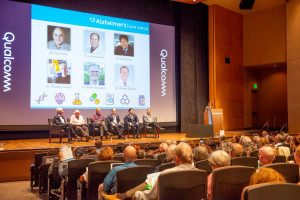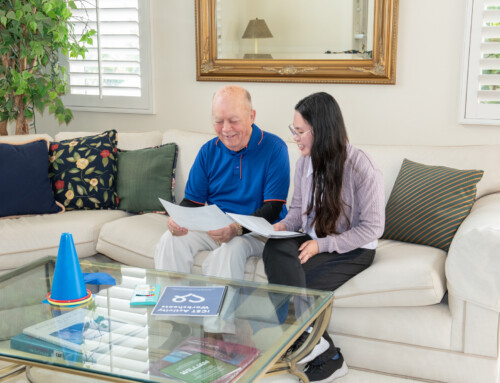By Kara Jacobsen
More than 450 people gathered at Irwin M. Jacobs Hall at Qualcomm on Saturday, August 24, 2019, to learn about the latest breakthroughs in Alzheimer’s research. They left full of knowledge – and hope.
The Date With A Cure research forum, held annually at Alzheimer’s San Diego, is a celebration of collaboration. Experts from different San Diego research institutions come together to share their work, and to answer audience questions.
In the foyer, guests lined up at different booths to ask their questions during the Clinical Trials Expo, while others mingled and took advantage of the delicious pastries and coffee. The program then officially began with a brief presentation from each panelist about their specific research.
RELATED | Alzheimer’s research in San Diego County
First up was Dr. Paul Aisen, director of the USC Alzheimer’s Therapeutic Research Institute (ATRI). Dr. Aisen emphasized his confidence in his team’s prevention capabilities, and he shared that their current focus is on early intervention techniques to disrupt the process of plaque buildup. He explained why this is a slow process, as figuring out how to attack each individual component of the buildup process will need extensive resources and research. Additionally, he highlighted his belief in the major development of blood tests indicating the presence of amyloid. “I see this moving towards complete validation within the scientific community” within the next few years, he said. Click here to download Dr. Aisen’s slides.
Dr. James Brewer, a neurologist and director of the UCSD Shiley Marcos Research Center, expressed how funding for this disease has doubled and showcased San Diego’s role in research based on the sheer density of medical care and genomics departments found locally. He explained that his team finds flaws in the mouse model and is instead looking at the brain’s structure through a new technology that analyzes the disease through a skin biopsy. The team discovered a way to translate skin cells into neurons allowing them to look at the brain and “the disease in a dish”. Click here to download Dr. Brewer’s slides.
Dr. Jerold Chun, Senior Vice President of the Neuroscience Drug Discovery Department at Sanford Burnham Prebys Medical Discovery Institute, examined the basics of DNA transcription and introduced his research with retro-transcriptase inhibitors from HIV drugs that reverse gene recombination. According to Dr. Chun, data on the prevalence of dementia would suggest thousands of older, HIV-positive patients should also have dementia – currently, only one person on HIV medication has developed Alzheimer’s. While doctors are able to administer these drugs to the general population, Dr. Chun cautioned there are side effects, and more controlled clinical trials are needed for complete adoption as a dementia treatment option. Click here to download Dr. Chun’s slides.
Dr. Michael Jackson, Senior Vice President of Drug Discovery and Development at Sanford Burnham Prebys Medical Discovery Institute, showed how robotics are playing a role in speeding up the chemical screenings process. He also stressed the importance of the Collaboration4Cure (C4C), a research initiative led by Alzheimer’s San Diego to fund local drug discovery projects. Dr. Jackson said C4C has funded 14 research projects exploring critical elements of Alzheimer’s disease pathology, including amyloids, tangles, and inflammation. One of those projects received more than $1 million in funding from the National Institutes of Health just last year, because of work that was accomplished through a C4C grant. Click here to download Dr. Jackson’s slides.
Dr. Brent Mausbach, a clinical psychologist from UC San Diego Health, has led numerous studies on the effects of caregiver stress. His research has shown that 41 percent of caregivers experience significant symptoms of depression – compared to only 14.6 percent of the average population. He shared that compared to dementia caregivers with low stress who are not depressed, those who are experiencing high stress and are depressed have a 438 percent increased risk for cardiovascular problems. Dr. Mausbach also said that symptoms of depression and anxiety radically decrease after an individual is moved into memory care or passes away. However, he found that in addition to psychological stress, a high volume of caregivers develop signs of physical stress in the form of cardiovascular disease, for which research indicates symptoms do not necessarily decrease. Click here to download Dr. Mausbach’s slides.
Finally, Dr. Michael Plopper, Medical Director of Sharp Clinical Research Center, discussed the reality of the clinical trials process. The first step is identifying willing participants who have the necessary qualifications, and then ensuring the research team has the ability to produce good quality data from those participants. He assured the audience that all research data is confidential and completely separate from an individual’s medical records. More than 80 percent of clinical trials fail to start on time because of a lack of participants. Dr. Plopper encouraged those with an interest in finding a cure for Alzheimer’s to consider participating in a local research project. Alzheimer’s San Diego can help connect you with the right study. Click here to download Dr. Plopper’s slides.
Amy Abrams, MSW/MPH, Director of Education with Alzheimer’s San Diego, led the Q&A portion of the morning. The panel tackled questions collected directly from the audience. One question related to studies on why many people with Down syndrome develop Alzheimer’s as they age. Dr. Aisen shared there is a new initiative from the National Institute on Aging studying this connection that he predicts will yield data in the next few years.
Another question asked about the accuracy of genetic tests like 23andMe. The researchers cautioned that ultimately there is no product marketed out there yet that accurately predicts one’s actual risk of developing Alzheimer’s disease.
RELATED | Read the San Diego Union-Tribune’s coverage of Date With A Cure
When asked about the effect of cannabis and CBD on caregiver stress, Dr. Mausbach and all the panelists agreed, that while marijuana may be a trending topic, there is still little medical research confirming its true impact.
The final question posed to all panelists asked: “If you could go back in time to when you were 40, what changes would you make to help reduce your risk of dementia.” The answers were pretty unanimous vouching for a healthy lifestyle, eating a Mediterranean diet, aerobic exercise, having the discipline to actually maintain these habits, and, appropriately from Dr. Plopper — to volunteer for clinical research!
Click here to sign up and learn more about local clinical trials.







